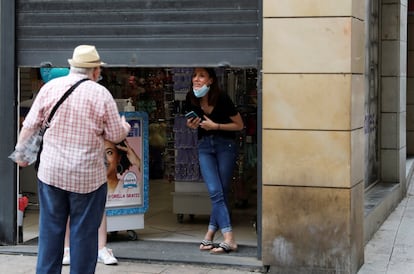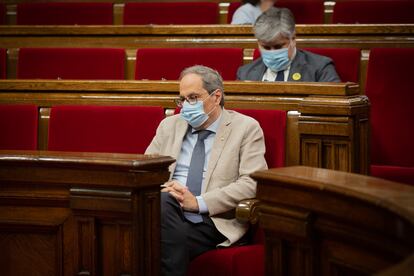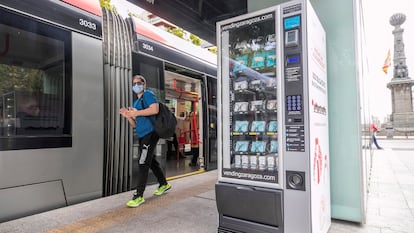With over 100 coronavirus outbreaks, more Spanish regions make face masks mandatory
Regional authorities are taking charge of controlling surges while the central government rules out a new state of alarm

Despite the rising number of coronavirus outbreaks in Spain, the government says it has no plans to restore the kind of emergency powers that led to one of Europe’s strictest lockdowns between March and June.
Sources in the Spanish executive said that regional authorities have enough tools at their disposal to control the current outbreaks, which now number over 100. One of the most recent ones was detected on Monday at a summer camp for children in Soria, where 20 minors and several camp counselors have been quarantined.
But the Spanish Health Ministry will take action when an outbreak affects two or more regions of Spain, according to an early response plan that the ministry will show regional leaders on Tuesday afternoon ahead of a Thursday meeting to approve the document.
Confined by decree

In Catalonia, regional premier Quim Torra said he will use a decree to provide legal backing for a decision to impose home confinement on 160,000 residents of the city of Lleida and seven nearby municipalities affected by a surge in coronavirus cases. The move comes after a regional court ruled against the decision, saying Catalan authorities do not have the power to impose stay-at-home orders.
In the nearby region of Aragón, the cities of Zaragoza and Huesca as well as four larger areas in the east are being moved back to a previous stage of the national deescalation plan that officially ended on June 21. Under the stricter rules, there will be limits on how many people can be admitted at one time inside stores, public swimming pools, bars and restaurants. Gatherings will also be restricted to 10 people at the most.
Mandatory masks

Meanwhile, the number of regional governments making face masks compulsory in public spaces keeps growing. Aragón, Asturias, Cantabria, Navarre, La Rioja, Catalonia, the Balearic Islands, Extremadura, Andalusia and Murcia have either made the face coverings mandatory or are about to. And in the Valencia region, premier Ximo Puig said on Monday that he is seriously considering the option and that the regional government will reach a decision this week.
The new rules make face masks compulsory in public even when a social distance of 1.5 meters between people can be observed. although exceptions are made for eating and drinking, at beaches and swimming pools, and when exercising.
Until now, the Spanish government’s “new normality” decree said that face coverings must be worn in public only when it is not possible to maintain the established distance. But the recent outbreaks have led some regional authorities to make the masks mandatory at all times.
“I don’t like making it compulsory, but seeing as how the epidemiological situation is getting worse and citizens’ attitude is growing relaxed, it is adequate,” said Magda Campins, head of preventive medicine at Vall d’Hebron hospital in Barcelona.
Catalonia was the first region of Spain to introduce the new rule, warning that violators could face €100 fines. Just 24 hours later, the Balearic Islands followed suit. Then came Extremadura in western Spain.

“We have to take measures to reduce community transmission, and in order to prevent that, it is necessary to take things seriously. When it comes to controlling the pandemic, it has been demonstrated that it is necessary to be assertive,” said José María Vergeles, the health chief of Extremadura, on Friday of last week.
On Sunday, the Andalusian premier Juan Manuel Moreno said the decision to make face masks mandatory was partly due to the “tourist-phobia” on display against visitors who fail to wear one.
Early response plan
The government’s new early response plan lists the actions considered necessary to prevent a repeat scenario of March, when Spain failed to act quickly against the epidemic and soon became one of the world’s worst-hit countries.
Under the plan, central and regional health officials will periodically analyze the situation, and if coronavirus transmission affects two or more regions, the Health Ministry will introduce “controlled health action.” In theory this will not include a nationwide confinement like the one that kept Spaniards at home during much of March and April. To do that, the government would have to declare a new state of alarm granting emergency powers to restrict fundamental citizen rights such as freedom of movement.
The plan also establishes that regional governments must have enough safety equipment to last eight weeks, while the central health ministry must stockpile enough material to cover 25% of the country’s healthcare needs.
English version by Susana Urra.
Tu suscripción se está usando en otro dispositivo
¿Quieres añadir otro usuario a tu suscripción?
Si continúas leyendo en este dispositivo, no se podrá leer en el otro.
FlechaTu suscripción se está usando en otro dispositivo y solo puedes acceder a EL PAÍS desde un dispositivo a la vez.
Si quieres compartir tu cuenta, cambia tu suscripción a la modalidad Premium, así podrás añadir otro usuario. Cada uno accederá con su propia cuenta de email, lo que os permitirá personalizar vuestra experiencia en EL PAÍS.
¿Tienes una suscripción de empresa? Accede aquí para contratar más cuentas.
En el caso de no saber quién está usando tu cuenta, te recomendamos cambiar tu contraseña aquí.
Si decides continuar compartiendo tu cuenta, este mensaje se mostrará en tu dispositivo y en el de la otra persona que está usando tu cuenta de forma indefinida, afectando a tu experiencia de lectura. Puedes consultar aquí los términos y condiciones de la suscripción digital.








































